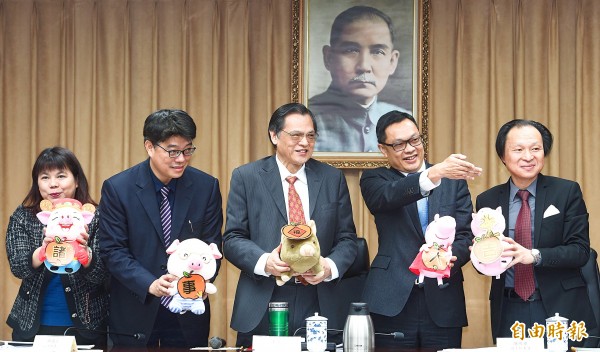《TAIPEI TIMES》 No plan to talk ‘1992 consensus’ with Han: Chen

From left, Mainland Affairs Council Deputy Minister Lee Li-jane, Deputy Minister Chiu Chui-cheng, Minister Chen Ming-tong, Deputy Minister Chen Ming-chi and Secretary-General Hua Shih-chieh yesterday hold toy pigs while filming a video in Taipei about the threat of African swine fever. Photo: Liu Hsin-de, Taipei Times
By Stacy Hsu / Staff reporter
Mainland Affairs Council Minister Chen Ming-tong (陳明通) yesterday said that he does not plan to discuss the so-called “1992 consensus” with Kaohsiung Mayor Han Kuo-yu (韓國瑜) in their meeting today, urging the public to stop wasting time fixating on the “consensus” and to focus on Beijing’s unification agenda instead.
Chen said the main purpose of the meeting is to listen to local government heads’ opinions about cross-strait issues.
“This [the ‘consensus’] is a pseudo-issue. The real threat and crisis facing Taiwan right now is Chinese President Xi Jinping’s (習近平) five points, which have laid down the steps toward unification,” Chen told a news conference in Taipei.
Xi listed five points for the peaceful development of cross-strait ties and unification in a speech about Taiwan on Jan. 2. They include exploring a Taiwanese version of the “one country, two systems” model used in Hong Kong and Macau, and retaining the option of using force against Taiwan to achieve unification.
Chen said he has “lost interest” in talking about the “1992 consensus,” given that Taiwan has spent the past two decades debating its existence.
While not directly answering a question whether he would talk to Han about his plan to set up a city-level cross-strait working committee based on the “consensus,” Chen said he has served as a member of a similar group in the Kaohsiung and Taipei city governments and that he has a positive attitude toward such committees.
There have been concerns that the Chinese Nationalist Party’s (KMT) resurgence in November last year’s local elections could see President Tsai Ing-wen’s (蔡英文) administration further sidelined in cross-strait dialogue, especially by KMT mayors such as Han.
Against this backdrop and in light of the apparent disparity between the cross-strait policies of the central government and those of KMT-governed cities and counties, the council earlier this month planned a series of meetings between high-level council officials and local government heads in the hope of cooperating on cross-strait issues.
So far, the council’s deputy ministers have visited Miaoli County Commissioner Hsu Yao-chang (徐耀昌), Nantou County Commissioner Lin Ming-chen (林明溱) and Lienchiang County Commissioner Liu Tseng-ying (劉增應), all KMT members.
Chen Ming-tong again urged Beijing to adopt a democratic system, which he said would be the best solution to its Taiwan problem.
“The Chinese Communist Party must acknowledge that Taiwan has never been a part of the People’s Republic of China and will never become a special administrative region under it,” Chen Ming-tong said, calling on Taiwanese to put aside their differences and work together to put the nation’s interests first.
The “1992 consensus” — a term former Mainland Affairs Council chairman Su Chi (蘇起) admitted making up in 2000 — refers to a tacit understanding between the KMT and the Chinese Communist Party that both sides acknowledge there is “one China,” with each side having its own interpretation of what “China” means.
However, Xi defined the “consensus” as “both sides of the [Taiwan] Strait belonging to ‘one China’ and being willing to work together to seek national unification.”
新聞來源:TAIPEI TIMES
%http://www.taipeitimes.com/















